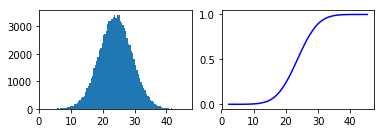Build Your Own Javascript Game in 5 Minutes
Hello Phaser.io (version 3) Phaser is a JavaScript library which makes it super easy for you to build games. It builds on top of WebGL, but if your browser doesn’t support that, falls back to canvas support. In this quick post, I will show you how to get up and running with your first game in literally 5 minutes (if you take mine as a starter). Note that I use the new version 3 while many tutorials and example games are written in version 2.
Monte Carlo for better time estimates of your work

As a developer, you are often asked how long it will take to program a certain module or feature for some software project. This can be annoying at times, so let’s make it more fun! In this post, we are going to use a data science approach to get up with better estimates. The whole post will be covered by simple Python code, which you can easily use for your own estimates.
Play Video Games Using Neural Networks
Deep Q Learning Today, I want to show you how you can use deep Q learning to let an agent learn how to play a game. Deep Q learning is a method which was introduced by DeepMind in their 2015 Nature paper (pdf) to play Atari video games by just observing the pixels of the game. To make it a bit simpler for the case of this blog post, we will use a slightly easier game which is to balance a polestick on a paddle.
Vim Commands You Should Know About
As a developer you gotta love Vim! It is easily available on almost any server you login to. Most of the times, it will already be installed. You can customize it to your needs, but you should be comfortable with its basic functionalities as you don’t want to tweak it on every server. I thus like to customize it a little bit, but try to stick close to the default. But the best thing about Vim is that after some time learning it, it is so much faster and easier to edit text than any other editor.
Database Backup in the Cloud using AWS
So, we all regularly create backups of important data, right? Right. Well, at least I hope you do. For your personal data as well as any company data you are dealing with. It is fairly easy and straightforward to create e.g. a MySQL backup on a server, zip it up and always keep the last 10 days as copies. However, what happens in case your whole server’s disks have an unrecoverable crash?